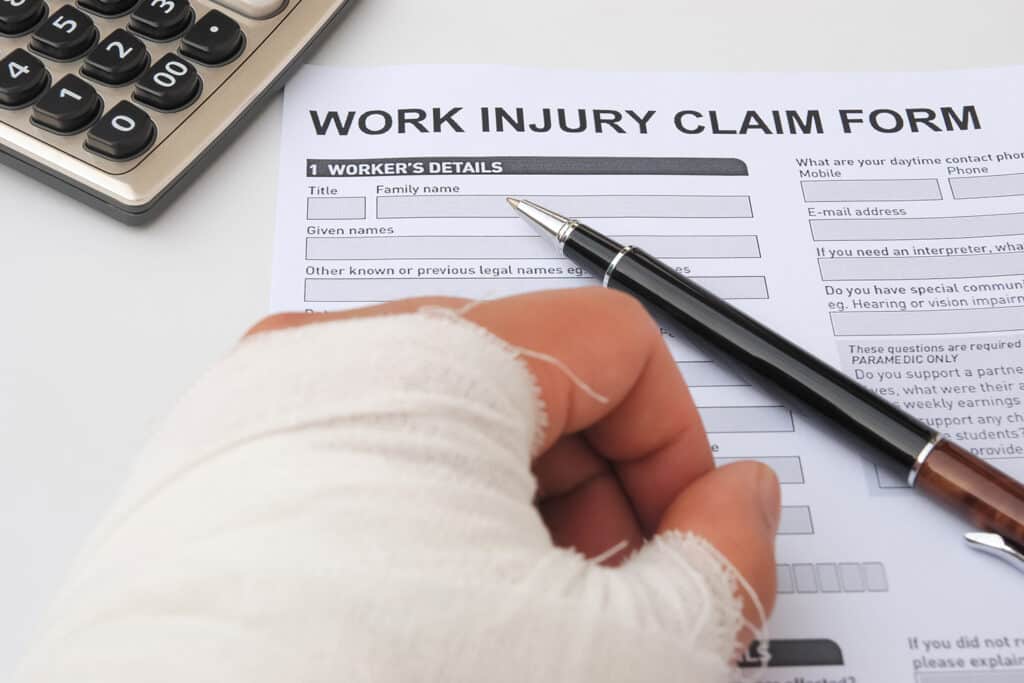Helpful Information
Visit the Employees’ Compensation Operations & Management site to register for an account and initiate a claim.
Form CA-1: Federal Notice of Traumatic Injury and Claim for Continuation of Pay/Compensation
This form is used for an event that happened in a single workshift.
Form CA-2: Notice of Occupational Disease and Claim for Compensation
This form is used for a long term event that happened in more than one workshift.
Form CA-7: Claim for Compensation
This form is used to submit claim for monetary compensation.
Contact Us
Fill out the form below or call us today at (888) 750-0980.
"*" indicates required fields
In-Person and Telehealth
What A Federal Employee Should Do When Injured At Work
Report to Supervisor
Every job-related injury should be reported to your supervisor as soon as possible. Injury in this case also means any illness or disease that is caused or aggravated by your employment as well as damage to medical braces, artificial limbs, and other prosthetic devices.
Obtain Medical Care
Before you seek medical treatment for a traumatic injury, ask your supervisor to authorize medical treatment using Form CA-16. This form may be obtained by contacting your employing agency’s workers’ compensation personnel. Take this form with you when you seek medical treatment and provide it to the physician/hospital. You have the right to choose the physician you initially see for medical treatment. This may be a private physician or, if available, a local Federal medical officer/hospital. Emergency medical treatment may be obtained without prior authorization. Note that in occupational disease claims, Form CA-16 may not be issued without prior approval from the Office of Workers’ Compensation Programs (OWCP).
File Written Notice
Claim forms must be filed using the Employees’ Compensation Operations and Management Portal (ECOMP). Go to www.ecomp.dol.gov and register for an account. For traumatic injuries, file Form CA-1 within 30 days following the injury, and for occupational disease claims, file Form CA-2. Once you complete your portion of the claim form, it will be forwarded to your supervisor who will complete the supervisor’s portion before forwarding the form for review. You will receive claim status update emails as your claim form is processed. For help filing your claim, click the “HELP” icon found at the top right hand corner of the ECOMP website, and then click the “FECA Claimant-Injured Worker” link.
Submit Claim for COP and/or Compensation For Wage Loss
If you are disabled due to a traumatic injury, you may elect to use the continuation of pay (COP) benefit for a period not to exceed 45 calendar days or use leave. To be eligible for COP, you must submit a CA-1 within 30 days of the injury. If disabled and claiming COP, you must submit medical evidence supporting your disability to your employing agency within 10 workdays. If you are disabled beyond the COP period, are not entitled to COP, or are disabled due to an occupational disease, you may file a claim for compensation using Form CA-7 at www.ecomp.dol.gov or use leave. You will receive claim status update emails as your forms are processed. A claim for compensation for disability should be submitted as soon as possible after it is apparent that you are disabled and will enter a leave-without-pay status.
Medical Billing
Medical providers must be enrolled with OWCP’s medical billing contractor to obtain payment. All providers must submit bills on standard billing forms to the London, KY mailing address or online at owcpmed.dol.gov. The standard billing forms accepted by OWCP are OWCP1500/HCFA 1500 for Physicians, physical therapists, labs, etc. and UB-92 for hospitals. Claimants may submit bills for reimbursement on forms OWCP-915 and 957.
Contacting OWCP
If you have any questions regarding your claim, you may contact OWCP at (202) 513-6860 or (866) 692-7487 (866-OWCP-IVR).
FAQ - Mental Health and Emotional Conditions
Can I file a FECA claim for a mental health or emotional condition?
Yes! If performance of work duties causes or aggravates a preexisting, mental health or emotional condition, a Federal employee may be entitled to benefits under the Federal Employees’ Compensation Act (FECA).
What types of mental health or emotional conditions are covered?
Any specific mental health condition may be compensable under the FECA. Examples of mental health conditions include depression, anxiety disorders, post- traumatic stress disorder (PTSD), and opioid use disorders. To be accepted as a condition under the FECA, your condition must be diagnosed by an appropriate medical specialist.
Who can diagnose and treat a mental health or emotional condition?
Mental health or emotional conditions must be diagnosed by an appropriate specialist. A condition related single traumatic incident, or a series of incidents contained with a single work shift is classified as a Traumatic Injury. A condition resulting from a Traumatic Injury may be diagnosed by a licensed physician of any specialty.
An example of a Traumatic Injury would be a postal service mail carrier held up at gunpoint and asked to hand over a package they are about to deliver resulting in an emotional or mental health injury such as anxiety.
Injuries or conditions that result from actions, events or exposure stretching over more than one work shift are classified as Occupational Diseases. Due to the complex nature of Occupational Diseases, these claims must contain a diagnosis from a psychiatrist or clinical psychologist.
An example would be a nurse employed by the Department of Veterans Affairs who works multiple shifts during and due to an emergency situation and develops an emotional or mental health illness such as post-traumatic stress (PTSD).
Appropriate medical specialists do not include physicians’ assistants; nurses; nurse practitioners and licensed social workers. These medical professionals may practice under the guidance of an appropriate medical specialist, but their findings are only valid as medical evidence under the FECA if their reports have been countersigned by an appropriate medical specialist.
Is a diagnosis all the medical information I need?
No. In addition to providing a valid diagnosis, your doctor must also provide a report that contains a complete and accurate history of your work exposure; a history of any previous emotional conditions and treatment you may have experienced; a detailed discussion of your physician’s examination and findings; and an unequivocal opinion relating your diagnosed condition to your reported work exposure as supported by detailed medical rationale explaining how your work exposure caused or otherwise contributed to your diagnosed condition.
How do I file an emotional condition claim under FECA?
You can initiate the process by filing a claim form through ECOMP; the claim will be sent to OWCP through your employer. For Traumatic Injuries you should file a CA-1 Federal Notice of Traumatic Injury and Claim for Continuation of Pay/Compensation. For Occupational Diseases you should file a CA-2 Notice of Occupational Disease and Claim for Compensation.
What other information will I need to provide to support my claim?
Your initial claim should contain or be accompanied by a complete statement identifying the exact nature of the work factors you believe to be responsible for the development of your condition. This should include specific examples to illustrate your claim and present OWCP with a full and clear idea as to what elements of your job have caused your mental or emotional condition.
Your statements alone will often not be sufficient to establish the facts of your claim. You may need to provide evidence that will corroborate your statement. That may include statements from other individuals who have actually witnessed the alleged events; emails exhibiting the alleged actions or behaviors; the results of any grievances or EEO complaints filed as a result of the alleged work events; or any other concrete documentation that will support the statements you’ve made.
What can cause a work-related emotional condition?
A work environment can have many factors that could potentially affect your mental health. Your reaction to a single traumatic event, such as an incident of workplace violence or a hostile confrontation may cause an emotional condition. Your condition could be caused by continued exposure to a form of harassment, abuse, or discrimination from an employer creating a hostile work environment. The cause of your condition doesn’t need to have been something done deliberately or maliciously. It could just be your exposure or reaction to your typical working conditions or a regular hazard of your employment.
How do I know if I’m suffering from an emotional condition?
According to the Substance Abuse and Mental Health Services Administration, the following are examples of the types of symptoms you may encounter if you are experiencing an emotional condition:
- Eating or sleeping too much or too little;
- Anger, feeling edgy or lashing out at others;
- Overwhelming sadness;
- Pulling away from people and things;
- Not connecting with others;
- Lack of energy or always feeling tired;
- Feeling like you have to keep busy;
- Having unexplained aches and pains, such as constant stomachaches or headaches;
- Feeling helpless or hopeless;
- Excessive smoking, drinking, or using drugs, including prescription medications;
- Worrying a lot of the time;
- Feeling guilty but not sure why;
- Thinking of hurting or killing yourself or someone else;
- Having difficulty readjusting to home or work life.
As you may notice, some of these symptoms overlap and others appear to contradict each other. Everyone’s mental health is different and the symptoms you experience may not be the ones someone else with the same condition experiences. The important thing to note is that, if you believe that you are experiencing an emotional condition, you reach out to a medical professional as soon as possible to get the help you need.
What if my employer is the one causing me stress? How can I trust them to report my claim?
While it is possible that your employer may be the entity that’s causing your mental or emotional stress, it is important to remember that you are protected from harassment and retaliation from your employer as a Federal employee. Your employer will have the right to review and respond to any allegations you make against them. Also, they are required by law to complete your claim form and forward it to OWCP for an independent and unbiased appraisal of the facts of your claim. Additionally, all Federal employees have the right to file a claim under the FECA by using ECOMP.
How can I treat a mental or emotional condition?
The Department of Labor’s website offers advice on assessing and dealing with mental health in the workplace.
More information can also be found through the Substance Abuse and Mental Health Services Administration. There are many different avenues for assisting in your mental well-being; however, if you’ve been officially diagnosed by a physician, you should rely on the medical advice provided by your physician in treating your emotional condition.
Federal civilian employees can file a claim or manage an existing claim under the Federal Employees’ Compensation Act online using ECOMP or by calling the FECA program at 202-513-6860.
Care and Support for Federal Employees
Find Out How We Can Help
Our expert case managers help you navigate the claims process and receive the benefits you deserve.


